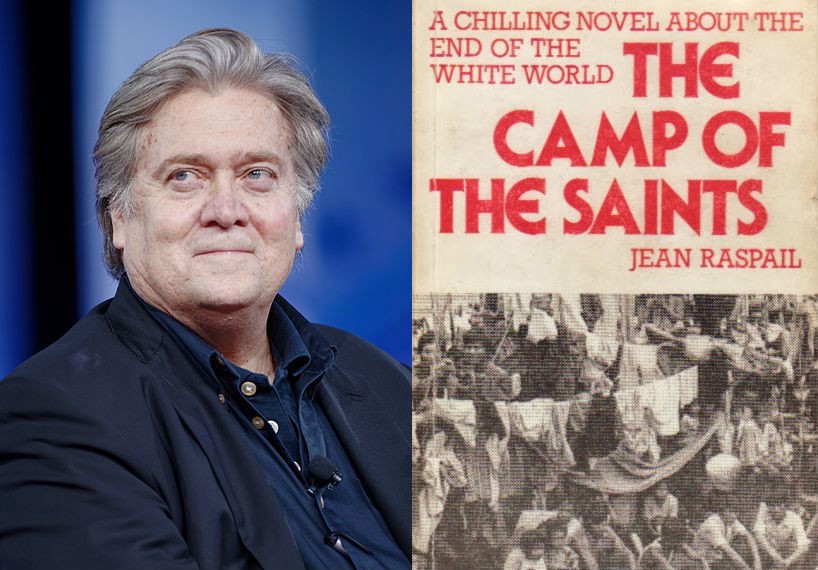news
Steve Bannon’s Touchstone Book is a Xenophobic, Racist French Novel

Is anyone surprised, though?

Prior to joining the White House staff, Steve Bannon was the executive chair of Breitbart News, the alt-right (euphemism for white-nationalist) media outlet known for breathlessly circulating conspiracy theories. In his current position as chief strategist to the President of the United States, Bannon is now in a position to whisper sweet-supremacist-nothings into the ear of (deep breath) the leader of the free world. This past weekend The Huffington Post unearthed a strange and disturbing tidbit about Bannon’s intellectual history: his abiding love for the French novel, The Camp of the Saints.
HuffPo’s Paul Blumenthal and JM Rieger noticed that when Bannon discussed immigration issues on Breitbart podcasts and radio programs, he consistently appealed to the widely-despised 1973 novel. The reporters put together a short clip of Bannon’s references. In addressing a perceived “invasion” of immigrants to the US and other western countries, Bannon consistently characterizes the situation with tired phrases like, “I call it the Camp of the Saints.”
If you’ve never heard of The Camp of the Saints before, it’s probably because you’re not a bigot. The book never gained traction in circles beyond the far-right. When an English version was released in 1975, Kirkus took no prisoners, concluding: “The publishers are presenting The Camp of the Saints as a major event, and it probably is, in much the same sense that Mein Kampf was a major event.”
You might be wondering: “Could it really be Mein Kampf bad?” Well, let’s just take a look at the book’s premise, as summarized by HuffPo:
The plot of The Camp of the Saints follows a poor Indian demagogue, named “the turd-eater” because he literally eats shit, and the deformed, apparently psychic child who sits on his shoulders. Together, they lead an “armada” of 800,000 impoverished Indians sailing to France. Dithering European politicians, bureaucrats and religious leaders, including a liberal pope from Latin America, debate whether to let the ships land and accept the Indians or to do the right thing — in the book’s vision — by recognizing the threat the migrants pose and killing them all.
That paragraph pretty much speaks for itself.
The novel was penned by Jean Raspail, a man Wikipedia describes, in high continental fashion, as an “author, traveler and explorer.” He has produced an extensive body of work in his lifetime and has received accolades for his contributions to geographical study. Oh, and in 2004 he was sued by the International League against Racism and Anti-Semitism for inciting racial hatred, although the petition was ultimately rejected by the court.
The book has gone to reprint a handful of times in the U.S. Scribner was the first American publishing house to take on the translated manuscript, but after poor sales the torch was handed to Cordelia Scaife May, sister of the conservative benefactor, Richard Mellon Scaife. The third time the book went to print was by John Tanton’s small publishing house, Social Contract Press, which advocates for extreme population control and has troubling historical connections to white nationalist groups; it has been named a “hate group” by the Southern Poverty Law Center. The book’s most recent run was in 2001; we wouldn’t be surprised if Bannon soon encourages a new edition.
The entire HuffPo article is well worth a look. But one more question for our own readership: how terrifying is this news? Readers and writers know better than most just how much our personal literary proclivities reveal.









